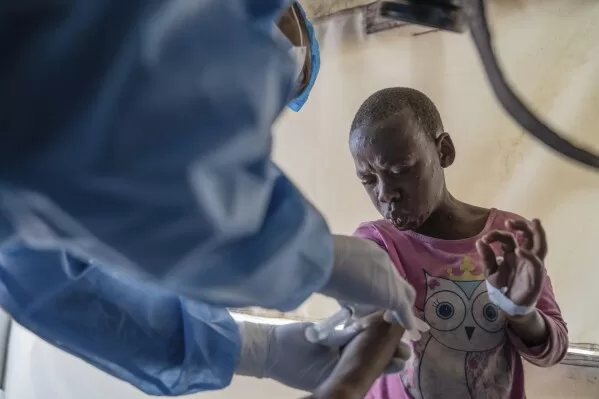Introduction: Urgent Mpox Vaccination
As the world grapples with the Mpox crisis, the Democratic Republic of the Congo (DRC) is taking significant steps to combat this outbreak. Following the World Health Organization’s (WHO) declaration of a global emergency due to the rising Mpox cases, vaccination efforts have officially commenced in the DRC. With the nation facing alarming statistics—30,000 suspected cases and 859 deaths—there is an urgent need to address the public health threat effectively.

The Current Situation: A Health Crisis in the DRC
The DRC has been significantly impacted by the ongoing Mpox outbreak, accounting for over 80% of reported cases in Africa. Health authorities are overwhelmed, particularly in the eastern city of Goma, where medical facilities are operating beyond their capacity. The strain on healthcare workers is palpable, as they attempt to manage a surge in infections attributed to a potentially more contagious strain of the virus.
To combat this dire situation, health officials have begun administering the first batch of 265,000 vaccine doses received from the European Union (EU) and the United States (US). The initial focus is on frontline workers and high-risk populations, as indicated by Health Minister Roger Kamba.
Vaccination Strategy and Future Plans
With an eye toward broader vaccination efforts, authorities have implemented strategic measures to ensure effective distribution and administration of the vaccines. Muboyayi Chikayal, the chief of staff for the health minister, emphasized the need for a robust plan to vaccinate all targeted personnel. The administration of vaccines specifically to adults reflects the current health guidelines, even as the majority of cases and fatalities have been reported among children under the age of 15.
In a hopeful turn of events, Kamba announced that an additional 3 million doses suitable for children are expected to arrive from Japan soon. This influx of vaccines will be crucial in protecting vulnerable populations, particularly children, who have been disproportionately affected by the outbreak.
A Call to Action: Global Support and Solidarity
The DRC’s situation highlights the necessity for international cooperation in addressing public health emergencies. Health officials in Africa have been vocal about the importance of solidarity rather than imposing travel bans, which can exacerbate the crisis. They stress that the failure to manage the Mpox outbreak poses risks not only to Africa but to the entire world.
Experts emphasize the need for comprehensive strategies that involve collaboration among various stakeholders. Dr. John Nkengasong, the Director of the Africa Centers for Disease Control and Prevention (CDC), stated, “The time for action is now. We must work together to ensure vaccines reach those in need and implement robust monitoring systems to prevent further spread.” His insights underscore the importance of a coordinated response to effectively combat the Mpox outbreak.
The global community’s response will be critical as health officials in the DRC continue to battle the ongoing crisis. They have called for increased support, both in terms of financial aid and vaccine supplies, to strengthen the nation’s healthcare infrastructure and improve its capacity to respond to infectious disease outbreaks.
Experts’ Opinions on Mpox Response
Leading experts have also weighed in on the need for timely interventions. Dr. Ayoade Alakija, co-chair of the African Union’s African Vaccine Delivery Alliance, pointed out, “Vaccination is our best defense against this outbreak. However, it must be accompanied by public awareness campaigns to educate communities about the importance of vaccination and preventive measures.” This statement highlights the dual necessity of vaccination and public education in combating Mpox.
Timeline of Events
- August 2024: WHO declares the Mpox outbreak in Central and East Africa a global emergency.
- October 5, 2024: DRC begins vaccination efforts with 265,000 doses from the EU and US, focusing on adults and at-risk populations.
- Upcoming: An additional 3 million doses for children expected from Japan, which will further support vaccination efforts.
Conclusion: The Path Forward
As the DRC embarks on this vital vaccination campaign against Mpox, it faces formidable challenges. However, the arrival of additional vaccine doses and the commitment of health officials to strategize effective vaccination programs provide a glimmer of hope. The international community’s support will play a pivotal role in curbing the outbreak and safeguarding public health in the DRC and beyond.
By prioritizing vaccination and fostering global cooperation, the DRC aims to mitigate the impact of Mpox and protect its citizens from future health crises. The path forward requires a unified approach, with emphasis on equitable vaccine distribution and ongoing public health education.
For Regular News and Updates Follow – Sentinel eGazette
FAQs
1. What is Mpox, and why is it a concern?
Mpox, formerly known as monkeypox, is a viral disease that has become a significant public health concern due to its recent outbreak in Africa. It is characterized by fever, rash, and swollen lymph nodes and can lead to severe complications, especially in children.
2. How effective is the Mpox vaccine?
The Mpox vaccine has shown efficacy in preventing severe illness and hospitalization. Vaccination plays a crucial role in controlling outbreaks and protecting vulnerable populations, including children and frontline health workers.
3. What are the symptoms of Mpox?
Symptoms of Mpox typically include fever, chills, fatigue, muscle aches, and swollen lymph nodes, followed by a rash that may develop into lesions. The disease can mimic other illnesses, making diagnosis critical.
4. Who is eligible for the Mpox vaccine in the DRC?
Initially, the vaccine is being administered to adults at risk and frontline healthcare workers. Future shipments of the vaccine will include doses specifically for children, addressing the needs of the most affected demographic.
5. How can communities help in the fight against Mpox?
Community engagement is vital. Raising awareness about Mpox, promoting vaccination, and encouraging individuals to seek medical attention if they show symptoms are essential steps in curbing the outbreak.